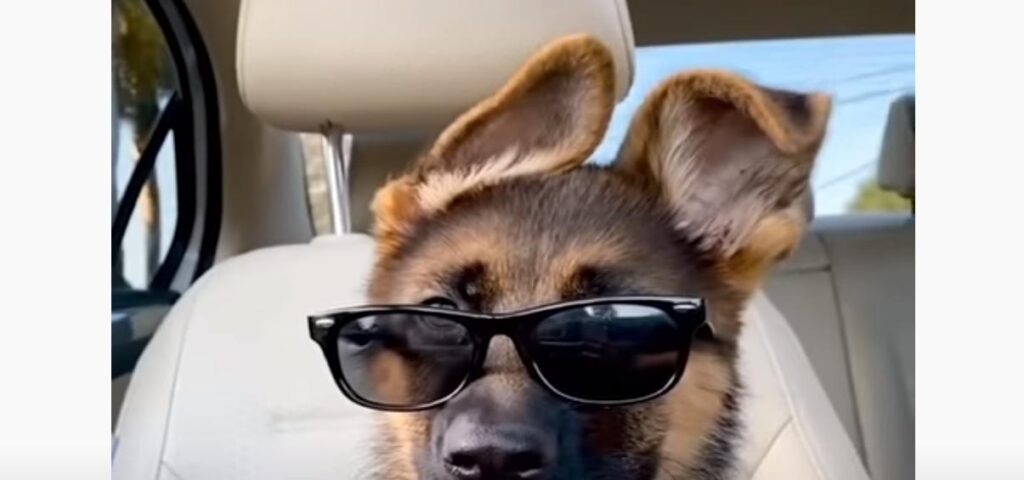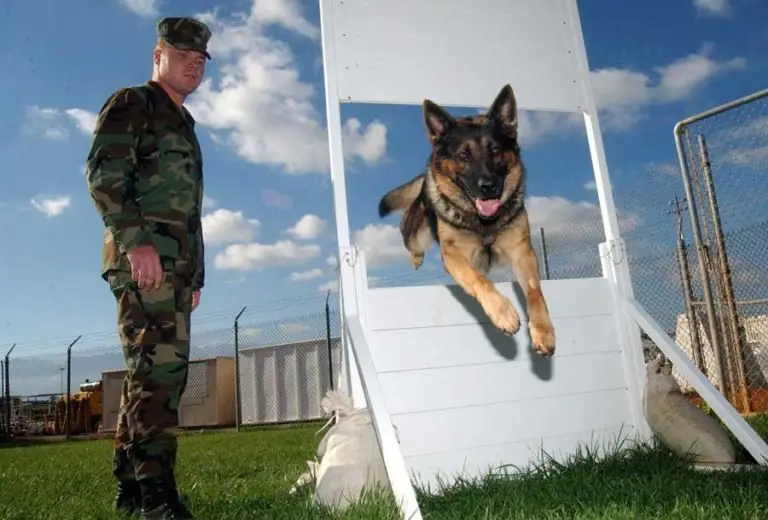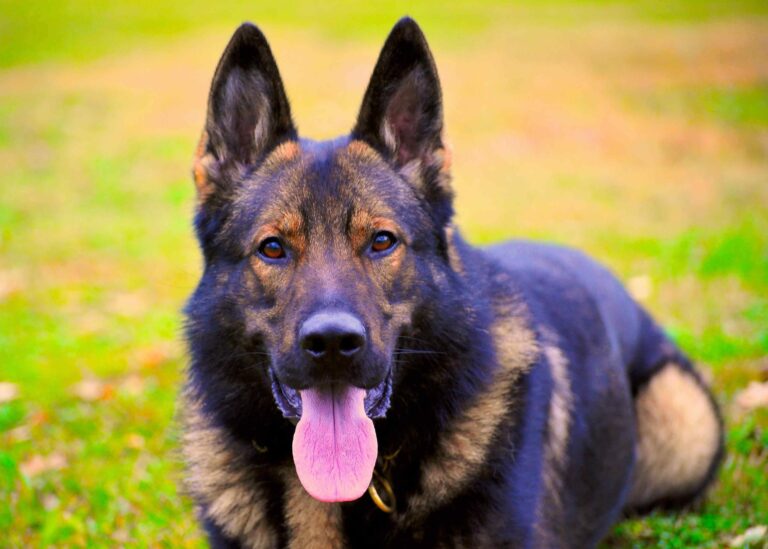Are German Shepherds Destructive?
German Shepherds are a high-energy breed that often develops destructive tendencies when their needs aren’t met. Without enough exercise, they can become bored and destructive. If they’re left alone too much, they can become anxious and start chewing on things to relieve their anxiety.
German Shepherds also have a strong prey drive, so if they see small animals like rodents or birds, they may chase after them and try to catch them.
There are a number of reasons why your puppy might begin to destroy everything, but luckily there are steps you can take to help solve and stop their destructiveness.
First, make sure your puppy is getting enough exercise every day – at least an hour of running around or playing fetch. This will help burn off some of their excess energy and keep them from getting bored.
Second, spend plenty of time with your pup – cuddle them, play with them, take them for walks – so they don’t feel anxious or lonely.

What are some reasons why your German Shepherd might start to destroy things?
German Shepherds are prone to destructive behaviors for a variety of reasons. Lack of physical or mental exercise is often the primary culprit, as these dogs require a significant amount of stimulation to stay happy and healthy. Other reasons for destructive behavior include teething, stress, illness, separation anxiety, and attention seeking.
In most cases, the solution to destructive behavior is simple: provide your German Shepherd with more exercise, both physical and mental. This may mean increasing the length or intensity of daily walks, adding in some interactive toys or games, enrolling in obedience classes, or even hiring a dog walker or daycare provider if you’re working long hours.
If you suspect that your dog’s destructive behavior is due to separation anxiety or another emotional issue, consult with a veterinarian or animal behaviorist for guidance on how best to help your furry friend.
How can you tell if your dog is destroying things out of boredom or anxiety?
German Shepherds are one of the most popular dog breeds in the world. They’re known for their loyalty, intelligence, and protective nature. But like all dogs, they can sometimes get bored or anxious – and when that happens, they may start to chew on things.
So how can you tell if your German Shepherd is chewing out of boredom or anxiety? There are a few key signs to look for.
First, dogs who chew to relieve stress usually only do so when left alone. If your dog starts chewing on things when you’re around, it’s more likely that he’s just bored. However, if he only chews when you’re not around (or if he seems especially stressed when you leave), it’s more likely that he’s suffering from separation anxiety.
Second, dogs with separation anxiety may display other signs of distress, such as whining, barking, pacing, restlessness, urination and defecation. If your dog is showing any of these behaviors along with excessive chewing, it’s a good indication that he’s anxious rather than simply bored.
Of course, every dog is different and some may exhibit both boredom-related and anxiety-related chewing behavior at different times. If you’re ever unsure about why your dog is chewing on something (or if you’re concerned that his behavior may be harmful), it’s always best to consult with a veterinarian or animal behaviorist for guidance.
What steps can you take to help prevent your German Shepherd from being destructive?
If you’re the owner of a German Shepherd, then you’re probably well aware of their reputation for being destructive. But there are steps you can take to help prevent your dog from causing too much damage around your home.
One of the best things you can do is to “dog-proof” your home. This means taking a look around and identifying anything that might be appealing to your dog as a chew toy – and either removing it or making it inaccessible. For example, if you have any loose cords lying around, tuck them away so they’re not within reach. Or if there’s an item that’s particularly tempting (like a shoe), make sure it’s out of sight and out of reach.
Another helpful tip is to redirect your GSD’sdestructive chewing to chew toys. If they start gnawing on something they’re not supposed to, quickly give them one of their toys and praise them when they start chewing on that instead. With enough repetition, they’ll learn that chewing on their toys is acceptable but chewing on other things is not.
You can also train your GSD to obey anti-chew commands such as “leave it” or “no.” These commands will come in handy if/when they do try to chew on something they shouldn’t – you’ll be able to quickly get their attention and stop the behavior before any damage is done.
It’s also important to keep your German Shepherd well exercised – both physically and mentally. A tired dog is less likely to act out in destructive ways than one who isn’t getting enough exercise.
What should you do if your German Shepherd starts destroying things in your home?
If you have a German Shepherd that is starting to destroy things in your home, there are a few things you can do to help correct the behavior.
First, it’s important to rule out any possible medical causes. If your dog is healthy and there are no underlying health issues, then you’ll need to start working on obedience training and building a stronger bond with your dog.
Make sure to provide plenty of exercise and mental stimulation for your German Shepherd to help prevent boredom and destructive behavior.
With patience and consistent training, you should be able to stop your German Shepherd from destroying things in your home.
Can crate training help reduce destructiveness in German Shepherds?
German Shepherds are known for being intelligent and loyal dogs, but they can also be destructive if not properly trained.
Crates can help reduce destructiveness in German Shepherds by providing a space for them to go when they’re feeling bored or anxious.
Research has shown that dogs who are crated for four hours per day during the workweek are less likely to develop negative behaviors like barking and chewing.
However, it’s important to note that crate training should not be used as a punishment; rather, it should be seen as a way to provide your German Shepherd with a safe and comfortable space of their own.
How can exercise help reduce destructive tendencies in German Shepherds?
German Shepherds are a high-energy breed of dog that need plenty of exercise to stay happy and healthy. Destructive tendencies in German Shepherds can include chewing on furniture or other objects, digging, and barking excessively.
Exercise is a great way to help reduce these destructive tendencies by providing German Shepherds with an outlet for their energy. Regular exercise can also help keep German Shepherds calm and relaxed, which may further reduce destructive behaviors.
What other methods can be used to help stop a German Shepherd’sdestructive behavior?
German Shepherds are intelligent and loyal dogs that make great companions. However, they can also be destructive if not properly trained.
Obedience training is the quickest way to train a German Shepherd to stop being destructive. Daily obedience training helps engage your dog and teach them basic commands and how to listen and pay attention to you.
In addition to obedience training, there are several other methods that can be used to help stop a German Shepherd’s destructive behavior.
Providing plenty of exercise is important for keeping German Shepherds happy and healthy. A tired dog is less likely to be destructive than one with pent-up energy.
Make sure your German Shepherd has plenty of toys and chew bones available, as this will give them something positive to focus their energy on.
Finally, consistency is key when it comes to training any dog – make sure everyone in the household is using the same commands and providing rewards for good behavior consistently.
Are there any risks associated with using punishment to try and stop a German Shepherd’s destructive behavior?
When it comes to German Shepherds, there are a few things you should know before using punishment as a means of stopping their destructive behavior.
For starters, punishment may not be effective in stopping the behavior altogether. In fact, it could even worsen the problem.
Additionally, punishment can cause stress and anxiety in dogs which can lead to other problems down the road.
So what should you do if your German Shepherd is exhibiting destructive behavior? The best course of action is to consult with a professional trainer or behavioral specialist.
They will be able to help you identify the root cause of the problem and come up with a customized plan to address it. This way, you can rest assured knowing that you’re taking the best possible care of your furry friend.
Frequently Asked Questions
How do you discipline a German Shepherd?
One of the most important things to keep in mind when disciplining a German Shepherd is to use distractions and redirection to stop bad behavior. For example, if your dog is barking excessively, you can try making a loud noise or calling its attention to something else in the room. If your dog is getting into things it shouldn’t, you can redirect its attention with a toy or treat.
It’s also important to reward good behavior with positive reinforcement. This could include giving your dog treats or verbal praise when it does something you want it to do. By rewarding desired behavior, you’ll increase the likelihood that your dog will repeat it in the future.
Finally, German Shepherds may benefit from short timeout periods to calm down. This could involve putting your dog in another room for a few minutes or having it stay in a “down” position for 30 seconds or so. Timeouts can help reset your dog’s energy level and give them a chance to calm down before resuming normal activity.
At what age do German Shepherds stop chewing everything?
German Shepherds will start to bite and chew everything at around 12-16 weeks old. This behavior may last until the pup is 6 months old. German Shepherds typically stop chewing everything by the time they are 6 months old.
How do I stop my German Shepherd from being destructive?
If you’re looking for the quickest way to stop your German Shepherd from being destructive, daily obedience training is the answer. Obedience training helps engage your dog through positive, reward-based interaction that helps them learn not only basic commands but also how to listen and pay attention to you.
While some level of destructiveness is normal for German Shepherds (and all dogs), if it’s becoming a problem, obedience training can be a great way to help curb unwanted behaviors. Through daily sessions of simple commands like sit, stay, come, and down, your dog will learn how to better focus their energy and attention on you. And as they become more responsive to your commands, they’ll be less likely to act out in destructive ways.
So if you’re wondering how to stop your German Shepherd from being destructive, start with daily obedience training. It’s the quickest and most effective way to help them learn self-control and good behavior.


